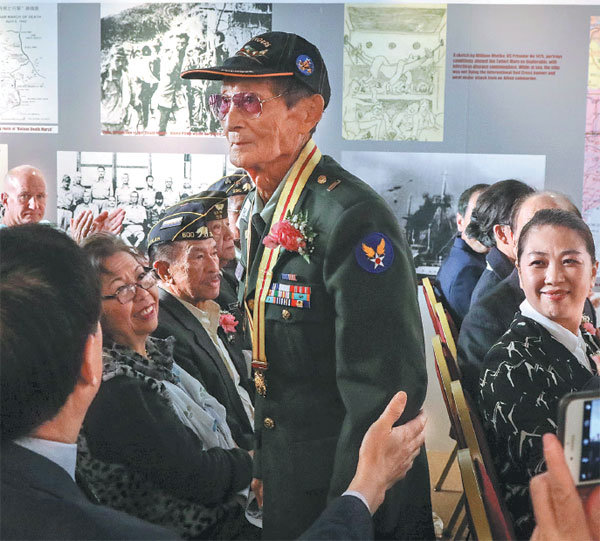POW camp horrors revisited

Exhibition shows how brutal wartime captivity brought out the best and worst of humanity
A traveling exhibition, now in San Francisco, tells the little-known story of how Allied prisoners of war ended up in one of the Japanese Army's most notorious prisoner-of-war camps, in Mukden (today's Shenyang), China. It recalls their darkest days there and their tenacious struggle against Japanese oppression.
The exhibition, Forgotten Camp, offers a glimpse into the hardship endured by more than 2,000 Allied prisoners, 1,200 of them from the United States, at the Shenyang World War II Allied POW Camp, from 1942 to 1945.
| Jerry Chen, a member of the famed Flying Tigers, attends the opening ceremony on Nov 21 of an exhibition in San Francisco on Japan's Mukden POW camp for Allied prisoners, in what is today Shenyang, China. Liu Dan / China News Service |
On display until Dec 5 at the WWII Pacific War Memorial Hall, the exhibition assembles 250 historical photographs and 42 artifact replicas from the permanent collection of the Shenyang WWII Allied Prisoners Camp Site Museum.
The camp held prisoners from six countries - the US, the UK, Canada, France, Australia and the Netherlands - but the US had the greatest number of prisoners and the largest death toll.
"More than 200 young and vibrant American soldiers weren't able to live to the moment of victory. Their names are inscribed on a memorial wall of the museum," Fan Lihong, curator of the exhibition and director of the Site Museum, told guests at the opening ceremony on Nov 21.
"Every inch of soil at the camp was soaked with the prisoners' blood, sweat, hope and struggle. This history should not be forgotten," she said.
Yet this camp and its story went unremembered for half a century until scholars uncovered it in 2003. A historical site and museum today, it is the best-preserved of the more than 200 POW camps established by Japanese forces in the Asia-Pacific theater during the war.
It stands as testimony to Japan's violation of international conventions on humane treatment and forced use of POW labor, and to the misery and suffering Allied prisoners endured, she said.
The prisoners were treated with relentless brutality. In the freezing winter, frostbite was not uncommon. Food and medical supplies were scarce. Prisoners were forced to hike five miles a day to work in a factory that manufactured weapons and parts for Japanese aircraft.
"While we have the opportunity to look back and revisit that part of history, there are lessons to be learned and spirits to be carried on," said Luo Linquan, the Chinese consul general in San Francisco. "Even in the dark days of harsh living conditions, inhuman torture, ubiquitous hunger and pervasive disease, the allied POWs didn't give up hope."
The exhibition also depicts the friendships that took root between the prisoners and local Chinese workers, who risked their lives to help them. There are photos showing some POW veterans who returned to Shenyang years later to reconnect with their old Chinese friends, who used to smuggle them food and medicine.
This is the second time the exhibition has traveled overseas, having visited Liverpool, England, in 2015. It was sponsored by the Chinese Consulate General in San Francisco, China Daily and the Shenyang WWII Allied Prisoners Camp Site Museum.
The exhibition offers firsthand accounts of the suffering and memories of the POWs, Florence Fong, co-founder and honorary curator of the WWII Pacific War Memorial Hall, said at the ceremony.
"If we don't learn from the past, we can't plan the future successfully," Fong said.
Jackie Huss Hallerberg, daughter of Walter Huss, who spent nine months in the Mukden camp until he was liberated in August 1945, says the exhibition moved her to tears. She says she doesn't remember how many times her father told her about his survivor's guilt.
"That trauma can be passed on through many generations. It's important to keep it in mind when we move forward," she says.
(China Daily Africa Weekly 11/24/2017 page14)
Today's Top News
- China's annual express delivery volume tops 170 billion
- Recruiters seek overseas graduates
- 2025 a crucial year to reflect on history
- Beijing, Washington agree to manage differences
- RMB expected to stay resilient, rebound despite headwinds
- 'Ice City' warms up for winter Games































